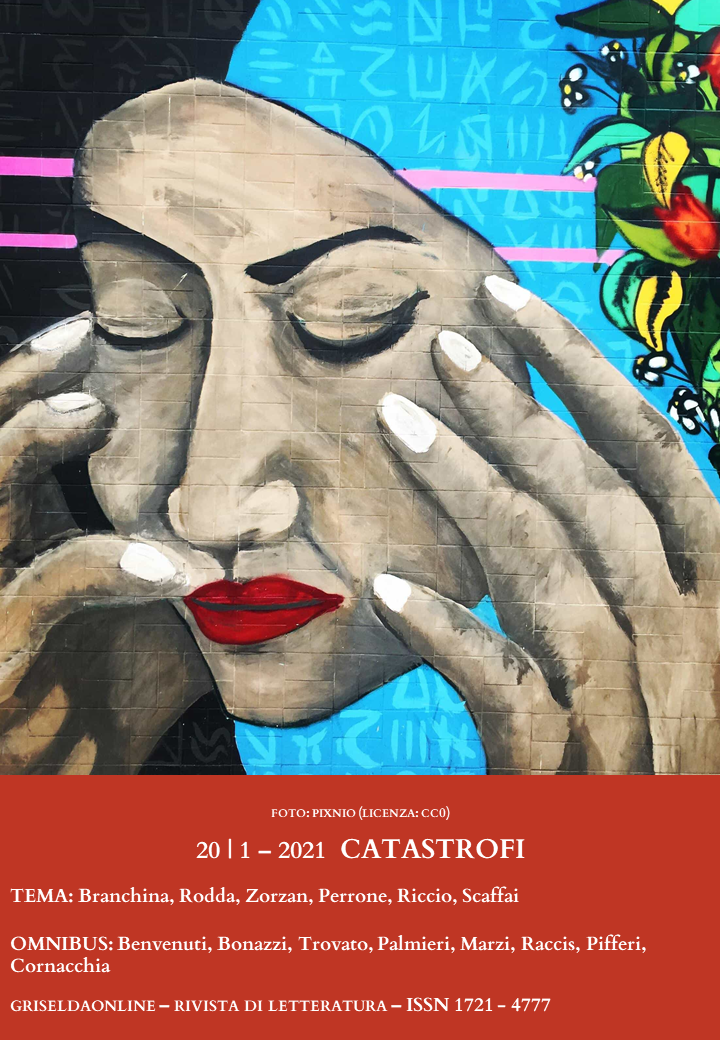Language and dystopia: the 'Newspeak' in George Orwell's «Nineteen Eighty-Four»
DOI:
https://doi.org/10.6092/issn.1721-4777/11503Keywords:
George Orwell, Newspeak, Linguistic relativity, Antoine Berman, iconic surfaceAbstract
In the dystopian world that George Orwell imagines in his novel Nineteen Eighty-Four, the hegemonic politic party Ingsoc promulgates the Newspeak, a language created in order to satisfy the ideological needs of the Party: to control the individual and prevent the exercise of his free thought. Imaginary languages have always played an important role within the dystopian genre: the structure of society is reflected in that of language, the intimate relationship between representation of reality language is exploited for political ends. The article investigates - through the perspective of linguistic relativism - the functioning of the relationship between linguistic sign and referent in Orwell’s Nineteen Eighty-Four. The study uses in particular the concepts of denotation and connotation and relates them to the iconic surface of words theorized by Berman.
References
P. Albani, B. Buonarroti, Aga Magéra Difúra, Bologna, Zanichelli, 2010;
J.-P. Andrevon, Anthologie des dystopies - Les mondes indésirables de la littérature et du cinéma, Paris, Vendémiaire, 2020;
M. Atwood, The Handmaid’s Tales, Toronto, McClelland and Stewart, 1985;
R. Barthes, Mythologie et le mythe d’aujourd’hui, Paris, Seuil, 1957.
A. Berman, La traduction et la lettre ou l’auberge du lointain, Paris, Seuil, 1991;
J.L. Borges, Finzioni, Einaudi, Torino, 1985, [Trad. di Franco Lucentini];
D. Breton, « Parlez-vous novlangue ? Du formatage des esprits en français et en espagnol contemporains, ou les enjeux d’une rupture entre mot et chose », «Babel», 26, 2012;
A. Burgess, A Clockwork Orange, London, Heinemann, 1962;
A. Colombo (a cura di), Utopia e distopia, Bari, Dedalo, 1993;
J.-J. Courtine, L. Willett, «A Brave New Language: Orwell's Invention of "Newspeak" in 1984», «SubStance», XXV, 2 – 50, The Johns Hopkins University Press, 1986, pp. 69-74, DOI: 10.2307/3684756;
J. Dewitte, Le pouvoir de la langue et la liberté de l’esprit. Essai sur la résistance au langage totalitaire, Paris, Michalon, 2007 ;
C. Dessy, V. Stiénon, (Bé)vues du futur: Les imaginaires visuels de la dystopie (1840-1940), Villeneuve d’Ascq, Settentrion, 2015;
T. De Mauro, Guida all'uso delle parole, Roma, Editori Riuniti, 1980;
A. Gales, « Vous avez dit novlangue ? », «Ballast», I, 2, 2015, pp. 88-97;
P. Gill, Colouring meaning : collocation and connotation in figurative language, Amsterdam, John Benjamins, 2011; https://doi.org/10.1075/scl.43;
G. Graffi, S. Scalise, Le lingue e il linguaggio. Introduzione alla linguistica, Bologna, Il Mulino, 2002;
N. Guilleux, Langue(s) et utopie – I : Remarques générales, «Kentron» XXVI, 2010, pp. 119-146. https://doi.org/10.4000/kentron.1395;
L. Hjelmslev, Prolégomènes à une théorie du language, Minuit, Paris, 1973;
E. Hobsbawm, The Age Of Extremes: 1914-1991, London, Michael Joseph, 1994;
A. Huxley, Brave New Word, London, Chatto & Windus, 1932.
C. Kerbrat-Orecchioni, Les Interactions verbales, tome II, Paris: A. Colin, 1992;
A. Krieg-Panque, «La “novlangue”: une langue imaginaire au service de la critique du “discours autre”», S. Branca-Rosoff (éd.), L’hétérogène à l’œuvre dans la langue et les discours. Hommage à Jacqueline Authier-Revuz, Limonges, Editions Lambert-Lucas, 2012, pp. 69-83.
I. Levin, This Perfect Day, London, Random House, 1970.
D. Maingueneau, Les termes clés de l’analyse du discours, Paris, Seuils, 2009;
I. McEwans, Solar, London, Random House, 2011.
N. Minerva, «Un contributo essenziale per un assetto armonico», «MORUS - Utopia e Renascimento», 6, 2009, pp. 424-433;
G. Orwell, 1984, Boston, Houghton Mifflin Harcourt, 1983 (I ed. 1947).
O. Pot (éd.), Langues imaginaires et imaginaire de la langue, «Cahiers d’Humanisme et Renaissance», 148, Genève, Droz, 2018;
A. Robinet, Le langage à l’âge classique, Paris, Klincksieck, 1978. p. 249.
V. Stiénon, «Séjours en dystopie, ou l’anticipation à la française », «Acta fabula», XIV, 6, 2013;
R. Vaissermann, «Uglossies», «Acta fabula», VII, 5, 2006 ;
M. Yaguello, Les Langues imaginaires. Mythes, utopies, fantasmes, chimères et fictions linguistiques, Paris, Seuil, 2019;
O. Reboul, «Parlons-nous déjà le « Newspeak » d'Orwell?», «Autres Temps. Les cahiers du christianisme social», 4, 1984. pp. 96-100;
P. Ronzeaud, L’utopie hermaphrodite, Marseille, C.M.R, 1981;
J.R.R. Tolkien, The Fellowship of the Ring, (1954); The Two Towers, (1954); The Return of the King, (1955), London, George Allen & Unwin;
R. Trousson, «Avant-propos», F. Sylos (éd.) «Uglossies, Travaux et Documents», XXIII, 2005.
G. Zhou, «The Language of Utopia», «Placing the Modern Chinese Vernacular in Transnational Literature», New York, Palgrave Macmillan, 2011, https://doi.org/10.1057/9780230117044_2;
Downloads
Published
How to Cite
Issue
Section
License
Copyright (c) 2021 Eleonora Marzi

This work is licensed under a Creative Commons Attribution-ShareAlike 4.0 International License.





